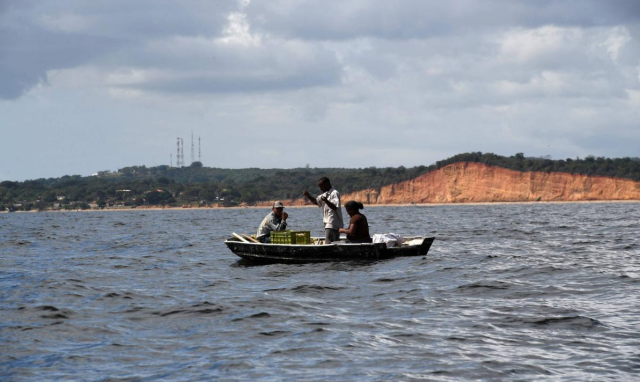
“The Golfete de Coro is dying, there is no longer the variety of fish there used to be in previous years, you step on the bottom and your feet fill with oil. We fishermen are migrating to other areas, because there are no other options,” said Carmen Padilla, spokeswoman for the Tiguadare fishermen on the Paraguaná Peninsula in western Venezuela.
Correspondent lapatilla.com
The group of fishermen who live on the beach from Punta Cardón to Médano Blanco, denounced that the submarine line number 2 that carries crude oil from Bajo Grande to the Amuay and Cardón refineries in the Paraguaná Refining Complex (CRP), and that crosses the “Golfete de Coro” (Coro’s Little Gulf). During the last three years, there have been countless spills and there are fewer and fewer marine species, making life impossible for artisanal fishermen.
This new spill was sighted last Wednesday at 6:00 am when fishermen were sailing offshore to catch fish. They spotted it two kilometers out from the Tiguadare bay, in Carirubana Municipality, and the oil slick already spreads to a length of about four kilometers in the sea.
Due to this serious environmental problem, which has generated a scarcity of marine species in the Golfete de Coro and has harmed the mangroves located in the Paraguaná Peninsula, fishermen in the area have been forced to migrate to other areas to be able to bring food to their homes. “We have gone fishing into the (mangrove) creeks, because in our normal fishing grounds you can no longer get even a kilo,” she said.
These fishing organizations have declared an emergency and ask to do the same for the “Golfete de Coro”, because the fishing townships can no longer withstand the current environmental conditions of the golfete, where there used to be found a great variety of species.
“We fishermen have lived from generation to generation thanks to the variety of fish in the golfete. Today the reality is that oil is killing everything in it and its importance as a unique mangrove that receives migratory birds all year long,” she said.
A new inspection
Lapatilla.com learned from oil workers that the gas leak that is ongoing since the beginning of the year, has finally been repaired, after many efforts to install spareparts that work, withstand the strong winds in the area, and wait several weeks of repair work to put a clamp that will withstand the pressure of the gas.
This Friday, August 11th, the PDVSA team of divers and fishermen from Punta Cardón went out to inspect the gas leak to begin drawing up the plan to put a clamp on it. “Those pipes are already obsolete, they are like a cookie, they have already completed their useful life, they are repaired on one side and a hole breaks out on another. No matter how many patches we make, it takes longer to make the repair than it lasts without a leak,” said a worker who preferred not to be identified.
Another employee of the state oil company said that these lines have not received maintenance for more than 20 years in accordance to safety standards and protocols. Long ago the lines used to be inspected at least twice a year.
“A “little pig” that has cameras is used and it moves along each of the lines, detecting the places that are about to break; After that, the pipe is repaired from the inside to avoid spills. Now it is done the other way around, it is expected that the spill will be spotted by a fisherman who reports to PDVSA (the Government’s oil corporation monopoly) and then an inspection is sent, to later begin to put a clamp over the pipe, fighting against the strong winds, the high tide and everything that working in deep water represents. Added to all the oil spilled that may have spilled into the sea,” said the worker who also preferred to remain anonymous.
Until the publication of this information, PDVSA had not made any pronouncement in this regard.

